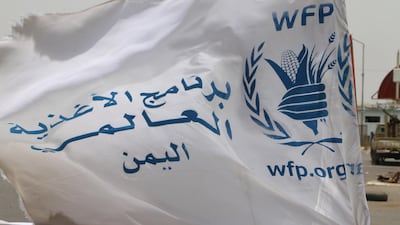The UN food agency on Sunday said that it had reached a deal with Yemen’s Houthi rebels to resume aid deliveries to rebel-held areas, after suspending relief in June.
The World Food Progamme accused the rebels of stealing food assistance and said the suspension would be confined to the capital, Sanaa.
"Following negotiations with the Sanaa-based authorities, the WFP signed a high-level agreement that is an important step towards safeguards that guarantee the accountability of our humanitarian operation in Yemen," spokesman Herve Verhoosel told The National.
“We are hopeful that technical details can be agreed to in the coming days."
Further details of the deal will be released later, Mr Verhoosel said.
Rebel leader Mohammed Al Houthi confirmed the deal was reached on Saturday.
The UN agency's chief, David Beasley, said it had found “serious evidence” that food supplies meant for those in need were diverted to areas controlled by Houthi rebels.
“Let me be crystal clear: children are dying right now because of this,” Mr Beasley told the UN Security Council.
Yemen has been devastated by the war that broke out after the Iran-backed Houthi rebels took control of Sanaa in 2014.
The rebels also manipulated lists of aid recipients and denied humanitarian workers access to areas that are most in need of assistance.
“Despite the immense suffering of 20 million Yemenis who do not have enough to eat, we continue to face fierce resistance simply to do our job to keep people alive,” Mr Beasley said.
The WFP is trying to feed about 12 million of Yemen's most vulnerable, nearly half of the population, at a monthly cost to the international community of about $175 million (Dh642.7m).
Many areas in Yemen are on the brink of being declared famine zones and the UN has called the situation the worst humanitarian disaster in the world.


